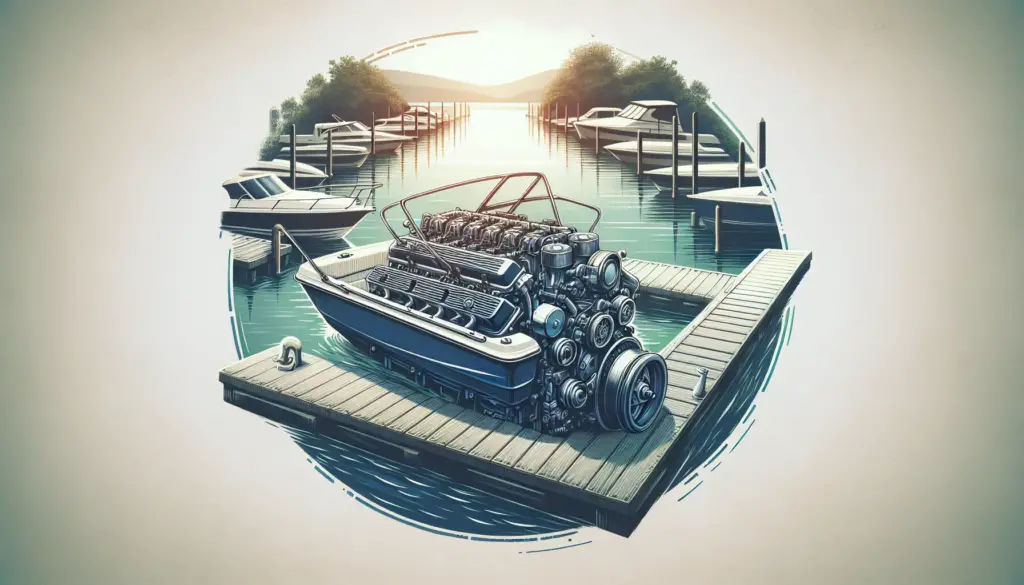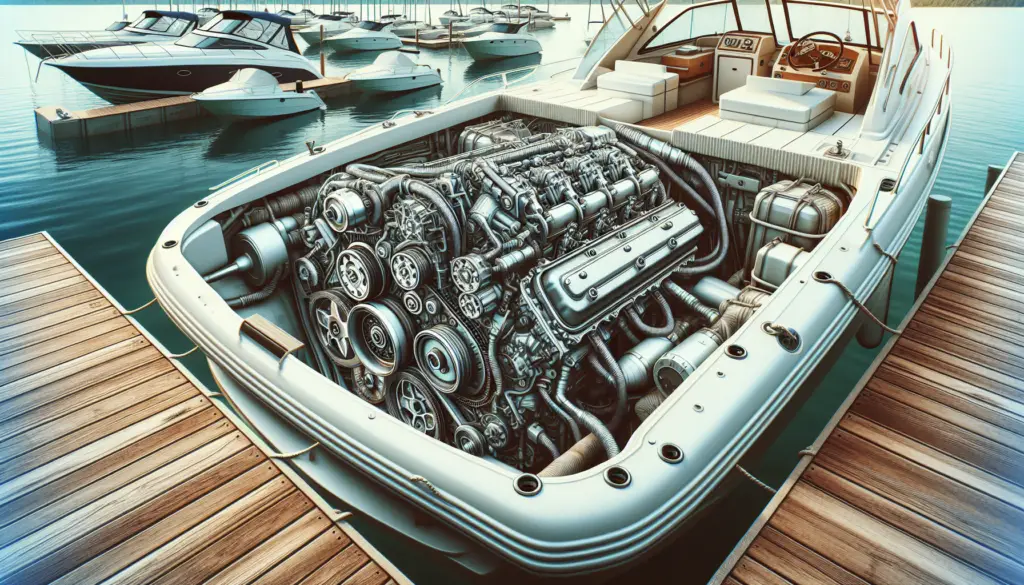Get ready to set sail and make the most of the recreational boating season by preparing your boat engine with some essential maintenance tasks. This article gathers around all the important checks and chores you need to carry out to ensure your boat’s engine is in top notch condition, for it lets you have worry-free, smooth sailing experiences. From routine inspections to addressing minor issues before they turn into major ones, you’ll find everything you need to get your boat and its engine ready for whatever adventures lie ahead. Embrace the wave of information that will provide you with a distinct advantage the next time you decide to venture into the deep!

Understanding the Importance of Boat Engine Maintenance
Owning a boat is more than just leisurely cruising on the water. There is a significant part of boat ownership that often gets overlooked, and that is engine maintenance. It’s as important as taking care of the boat’s exterior beauty. Let’s dive in and understand the reasons.
Significance of regular engine maintenance
Regular engine maintenance is key to getting optimum performance and longer service life from your watercraft. By regularly checking and servicing your boat’s engine, you can detect minor issues and address them before they become significant problems that could impair your vessel’s performance or lead to costly repairs. Regular maintenance also ensures that your boat is always ready for that spur-of-the-moment cruise, assuring the smooth running of your boat when you need to sail it.
Implications of neglecting engine maintenance
Ignoring the signs of engine damage or delaying regular maintenance can have serious implications. An unattended engine issue can escalate into a severe machine malfunction, putting both your boat’s functionality and your safety at risk. Moreover, neglecting engine maintenance can significantly shorten the lifespan of your boat’s engine. In the worst-case scenario, you could be facing a complete engine replacement, a costly venture indeed.
Reviewing the Boat Engine Manual
A step often overlooked by boat owners is reading and understanding the boat engine manual. This tool can shed light on so many aspects of your boat engine, so ignoring it is not an option!
Familiarizing yourself with boat engine specifications
Every boat and engine comes with their unique specifications. Understanding these specifics is crucial for efficient usage and maintenance. The boat engine manual provides detailed information about the particular make and model of your engine and its individual components. By familiarizing yourself with your boat’s engine specifications, you can understand its unique needs and ensure that it performs at its best.
Understanding manufacturer’s routine maintenance schedule
The engine manual also provides guidelines on the engine’s regular maintenance schedule. It’s a timeline when each part needs servicing, or the whole engine needs an overhauling, or simple tasks like oil changes. These schedules, recommended by the manufacturer, can help maintain your engine efficiently, ensuring that it runs smoothly for a longer time.
Inspecting Boat Engine for Visible Damage
Before diving into the maintenance tasks, start with a careful inspection to uncover any visible signs of damage.
Checking for visible signs of wear and tear
Take the time to carefully inspect your boat’s engine for any signs of wear and tear, such as cracks or rust, abnormal noises, or leaks. Pay close attention to signs of corrosion, as salt water is notably corrosive to metals and can lead to severe engine damage. If you notice any, take immediate action.
Ensuring all visible components are in good working order
This step involves confirming that all visible components, such as hoses, lines, and connections, are in good operating condition. Loose or broken parts can be hazardous and should be replaced right away.
Cleaning the Boat Engine
A clean boat engine is crucial for the smooth running of the machine. Here’s how you do it.
How to properly clean your boat engine
Over time, your boat engine may accumulate dirt, salt, and other forms of debris. A clean engine allows you to detect any leaks, corrosion, and damage easily. When cleaning your engine, be sure to use suitable cleaners recommended by the manufacturer and follow the correct cleaning procedure to avoid damaging any engine components.
The importance of a clean engine before starting maintenance
Cleaning your boat’s engine before regular maintenance is essential. A clean engine reduces the chances of dirt and grime entering critical parts during the maintenance process, thus keeping it all well-greased and functional.

Changing Engine Oil and Filter
Changing the engine oil and filter is one of the key steps in boat engine maintenance.
Choosing the right engine oil
Choosing the right engine oil is crucial as different engines require different types of oil. Make sure to refer to your engine manual to understand which specific oil type your engine requires.
Steps to changing engine oil and filter
Changing the oil and filter involves removing the old oil and replacing it with fresh oil. Similarly, the filter has to be replaced with a new one to ensure clean oil free from contaminants. Detailed instructions on how to perform these steps are usually provided in the engine manual.
Proper disposal of old engine oil
Old engine oil should be disposed of properly as per local and state guidelines. It is your responsibility to ensure that the old oil does not pollute the environment.
Checking the Fuel System
A regular examination of the fuel system is needed to ensure a safe journey on your boat.
Steps to inspect and clean the fuel system
Look for any visible issues like leaks, damages to the fuel lines, or broken parts. It’s important to clean your fuel tank, replace the fuel filter regularly, and clean the fuel injectors to ensure efficient fuel combustion.
Identifying and resolving potential fuel system issues
Proper maintenance can help to mitigate potential issues such as clogged fuel lines, a faulty fuel pump, or water in your fuel. These issues if ignored, can lead to suboptimal engine performance or worse, serious damage to your engine.
Servicing the Cooling System
Maintaining a healthy cooling system is vitally important to preventing your boat’s engine from overheating.
Understanding the role of the cooling system
The cooling system in your boat performs the essential function of removing excess heat from your engine, thus preventing overheating and subsequent engine failure.
Essential tasks for cooling system maintenance
Regular flushing of the cooling system, checking the thermostat for correct operation, inspecting hoses for leaks or cracks, and ensuring the circulation pump is working properly are vital elements of your cooling system’s routine maintenance.
Assessing and Maintaining Engine Belts
Engine belts are another crucial component that needs attention during your engine maintenance.
Identifying worn engine belts
Engine belts play an integral role in an engine’s operation. Over time, these belts can are subjected to wear and tear. Worn belts can affect the engine’s functionality and may even cause engine damage if not replaced in time.
Steps for replacing engine belts
When replacing engine belts, ensure to choose the correct size and type suitable for your engine. It’s a careful process that often requires professional handling. Refer to your boat engine manual for specific instructions on replacing these belts.
Examining the Electrical System
A well-functioning electrical system is crucial for your boat’s smooth operation.
The importance of a healthy boat electrical system
An efficient electrical system ensures that your boat’s ignition, lighting, and other electrically powered systems operate correctly. Regular checking of all electrical connections, battery condition, and onboard electrical appliances goes a long way to ensure a trouble-free boating experience.
Identifying and addressing common electrical system problems
Some common electrical system issues include loose or corroded connections, blown fuses, or a drained battery. Regular monitoring and timely repairs can help to mitigate such issues, ensuring your boat’s electrical system is in top shape.
Final Check and Test Run
After all these maintenance tasks, it’s time for a wrap-up and test run!
The importance of performing a final check
Once all maintenance tasks are completed, a final check is crucial to make sure you haven’t overlooked anything. Go over all the systems, parts, and areas you’ve worked on to ensure everything is how it should be.
Proper protocol for a test run before the recreational boating season
Finally, it’s time for a test run! Operating your boat under real conditions is the best way to confirm that all components are working correctly, ensuring it’s ready for the recreational boating season.
In conclusion, regular boat engine maintenance is a must-do if you want to extend your engine’s life and performance. Make sure to keep this guide handy as a reference, and you’ll undoubtedly have a safe and wonderful boating season ahead of you!

